
The National Center on Safe Supportive Learning Environments (NCSSLE) provides data, lessons learned, events, and products to help inform college and university administrators about existing and emerging issues in higher education. NCSSLE both shares resources and develops products. The NCSSLE products listed below–webinars, case studies, and prevention updates–provide evidence-based approaches and best practices to successfully address campus prevention issues and implement strategies that improve student success.
NCSSLE's bimonthly Higher Education e-Digest informs readers of new tools, field practice, research findings, upcoming training and conference events, and other resources related to campus and community health and wellness, safety and security, and campus climate.
NCSSLE higher education webinars bring together experts in the field to provide information relevant to higher education audiences, such as town-gown collaboration, campus safety, and preventing high-risk drinking.
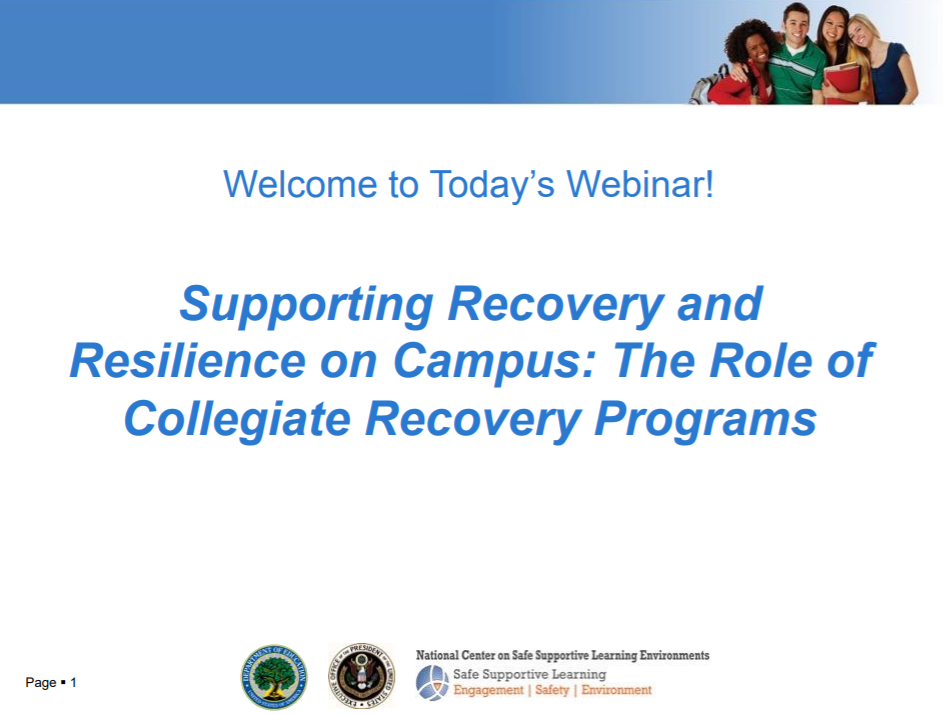 | Supporting Recovery and Building Resilience on Campus: The Role of Collegiate Recovery Programs. This U.S. Department of Education and NCSSLE webinar addresses how Institutions of Higher Education (IHE) are providing support to students recovering from opioid, alcohol, stimulants, and other drug or substance abuse disorders, or know of someone who may be recovering, through collegiate recovery programs and similar initiatives. Collegiate recovery programs were recently highlighted in the 2019 National Drug Control Strategy. The webinar is designed for IHE administrators, professionals in student affairs, health services, and residential life; and students interested in starting a collegiate recovery program. Examples of collegiate recovery programs currently being used on campuses of large public universities and on the campus of a community college are highlighted. |
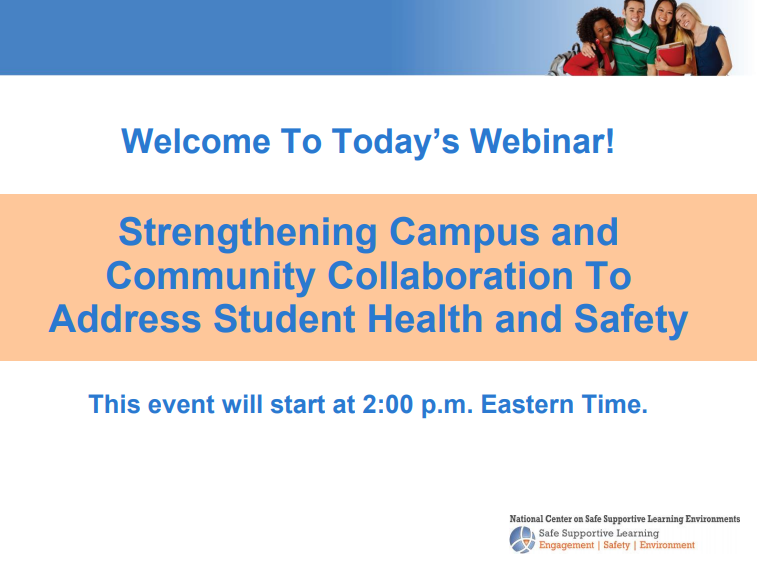 | Strengthening Campus and Community Collaboration to Address Student Health and Safety. This NCSSLE webinar discusses a campus-community collaboration to reduce high-risk drinking and its consequences. Since 2005, The University of Massachusetts, Amherst and the city of Amherst, Massachusetts have pursued a multi-faceted collaboration to provide environmental interventions to prevent high-risk alcohol use and promote a safe and healthy environment for campus and community that is conducive to learning. |
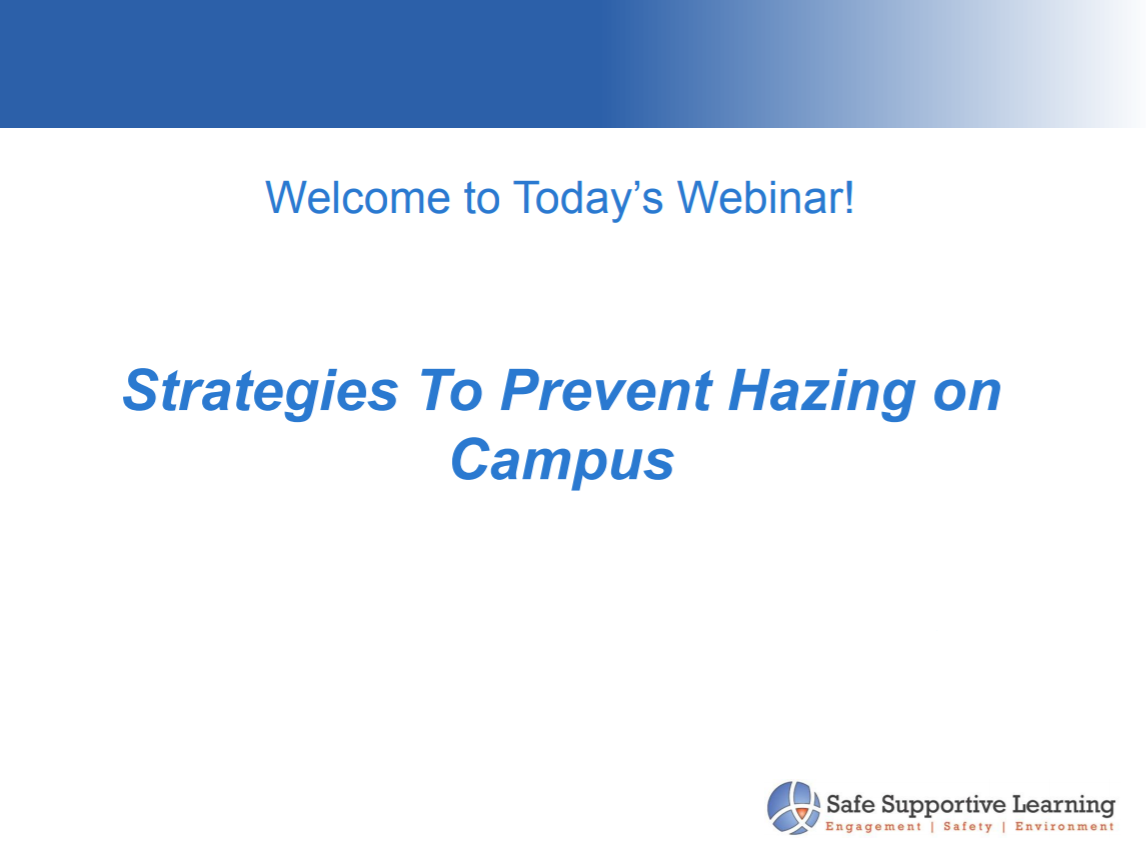 | Strategies to Prevent Hazing on Campus. The National Center on Safe Supportive Learning Environments (NCSSLE), funded by the U.S. Department of Education’s Office of Safe and Healthy Students, hosted a webinar on March 3, 2016 from 2:00- 3:30 pm (EST) discussing the latest research on strategies to prevent hazing and described implications for campus personnel in both secondary and Higher Education settings. This is the second in a series of webinars dedicated to the topic of hazing. Building on the foundation of an overview of hazing presented on December 17, 2015, this event will provide specific strategies for hazing prevention.The information that was provided in this webinar will support campus efforts to create a more productive and supportive learning environment. |
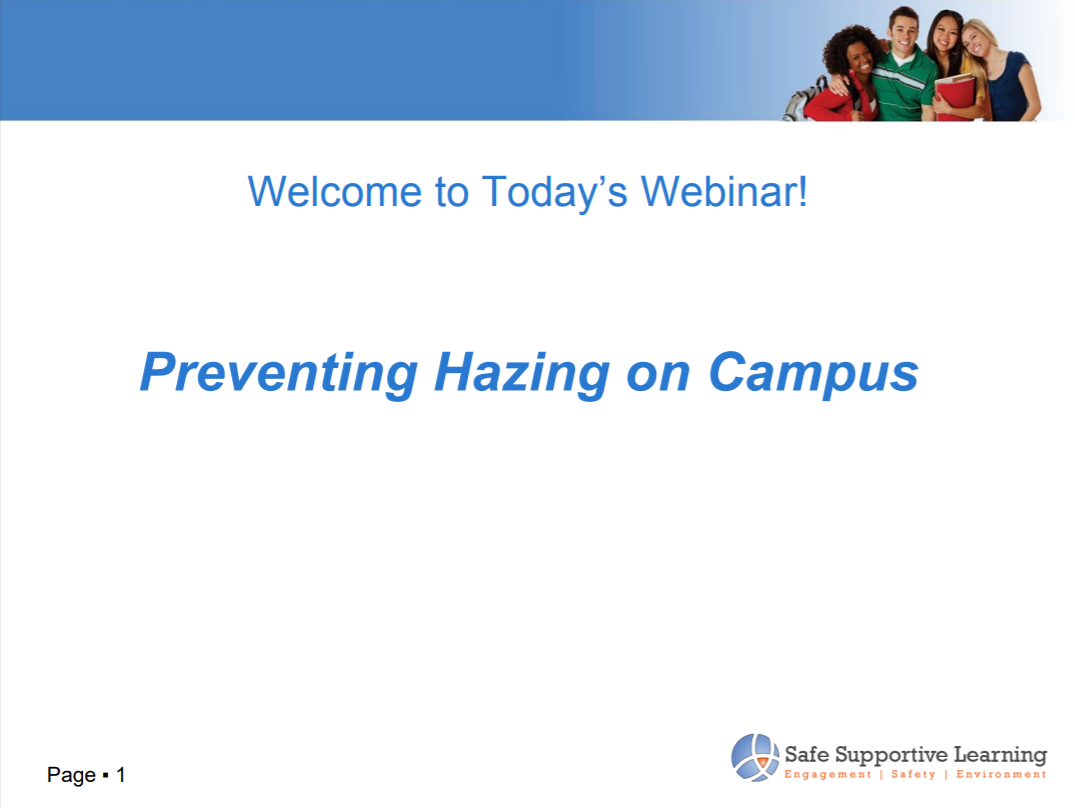 | Preventing Hazing on Campus. The National Center on Safe Supportive Learning Environments (NCSSLE), funded by the U.S. Department of Education’s Office of Safe and Healthy Students, hosted a webinar on December 17, 2015 from 2:00- 3:30 pm (EST) and discussed the latest research on hazing and described implications for campus personnel. The event featured a video introduction from Secretary of Education Arne Duncan and also offered practical strategies, tools and resources to prevent hazing incidents. The information provided aimed to support campus efforts to create a more productive and supportive learning environment. |
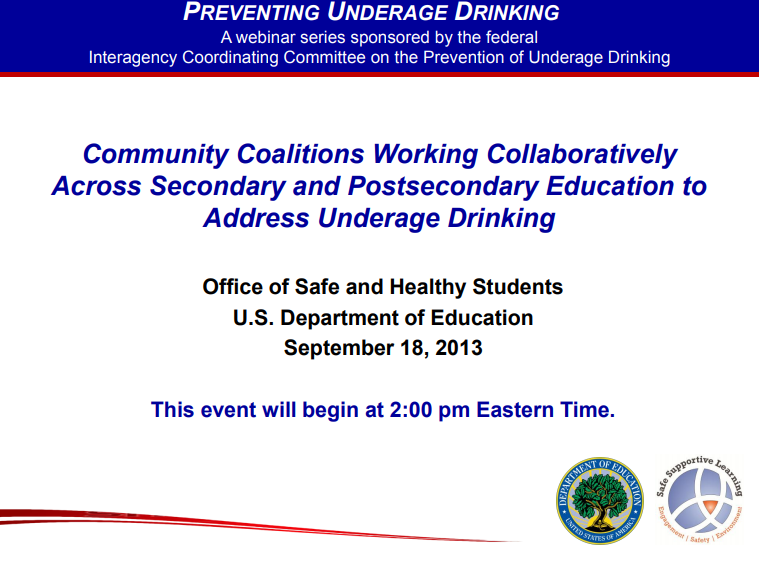 | Community Coalitions Working Collaboratively Across Secondary and Postsecondary Education to Address Underage Drinking. This event was the sixth webinar in the Preventing Underage Drinking webinar series offered by the Federal Interagency Coordinating Committee on the Prevention of Underage Drinking. It was hosted by the U.S. Department of Education’s Office of Safe and Healthy Students via the National Center for Safe Supportive Learning Environments. In this webinar, panelists explored prevention research that strongly supports the use of comprehensive, integrated programs with multiple complementary components to address underage drinking. Such evidence-based prevention strategies geared to secondary and post-secondary students require collaborative efforts between organizational leaders at high schools and colleges, and key community members. |
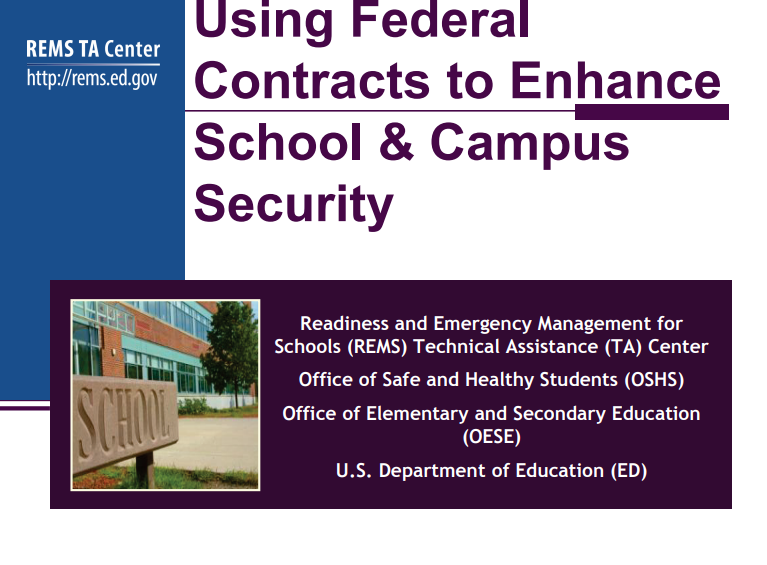 | Using Federal Contracts to Enhance School & Campus Security. This webinar, presented by the Readiness and Emergency Management for Schools Technical Assistance Center, provided participants with an overview of the Cooperative Purchasing Program; a better understanding of program eligibility and benefits; and the ability to access information to help increase accessibility to safety and security equipment and services for public institutions of higher education. |
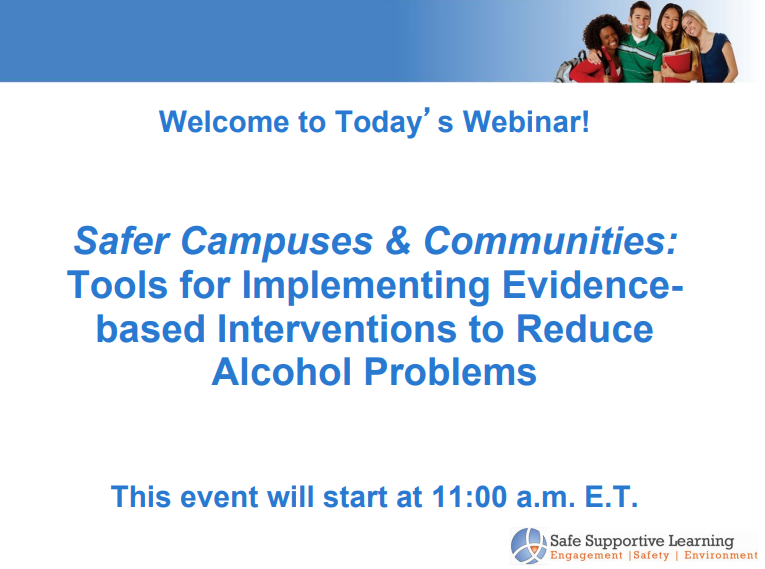 | Safer Campuses and Communities: Tools for Implementing Evidence-based Interventions to Reduce Alcohol Problems. In this webinar, presenters reviewed research-based approaches to reducing alcohol-related problems among college students and considered how to apply the Safer Campuses and Communities resources. They then shared how some colleges had been implementing evidence-based interventions to reduce alcohol problems on their campuses and in their communities. |
The NCSSLE case studies provide a deep dive into how campuses across the U.S. are operationalizing current research and best practices to foster safe, healthy, welcoming campuses for diverse student populations.
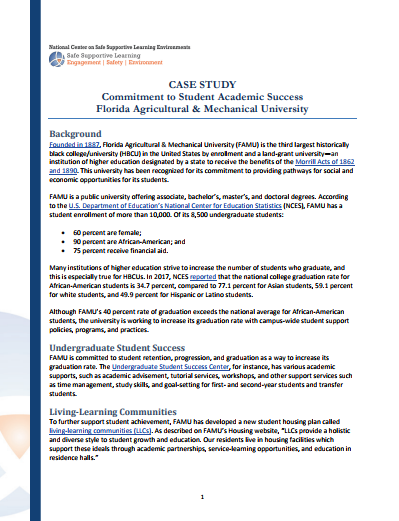 | Florida Agricultural & Mechanical University (FAMU). FAMU is a historically black university that is working to increase its graduation rate with campus-wide student support policies, programs, and practices. |
 | Oregon State University. Oregon State is working in collaboration with leaders from the city of Corvallis, Oregon to mitigate the negative effects associated with the University’s growing enrollment. |
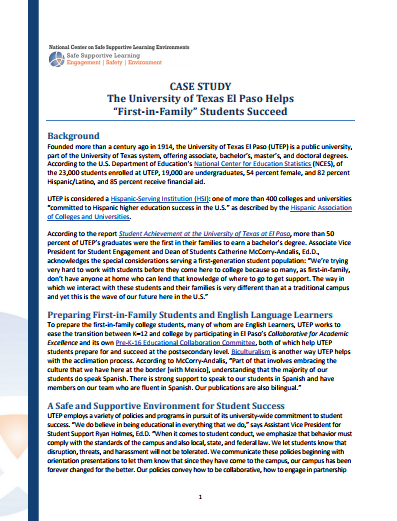 | The University of Texas El Paso (UTEP). To prepare first-in-family college students, UTEP is easing the transition between K-12 and college by employing policies and programs in pursuit of a university-wide commitment to student success. |
The NCSSLE higher education updates explore current and emerging concerns among campus administrators, and offer strategies and best practices to cultivate safe, supportive environments that promote student success.
Period Poverty Among College Students: Access, Equity, and Strategies to Address the Issue. This brief highlights the equity issues and negative consequences related to lack of access to menstrual products at institutions of higher education (IHEs), and describes promising practices for IHEs to help increase access to menstrual products. | |
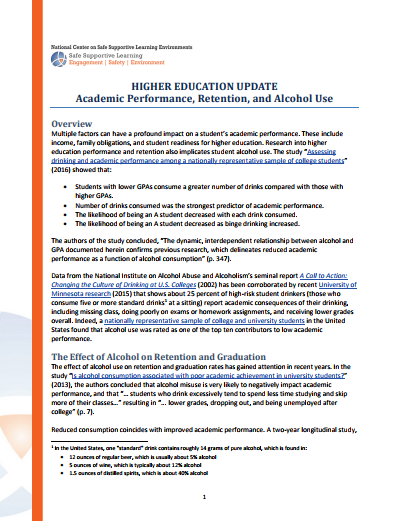 | Academic Performance, Retention, and Alcohol Use. The effect of alcohol use on student success has gained attention in recent years. Colleges and universities can implement evidence-based policies and programs to reduce college students’ drinking and increase retention and graduation. |
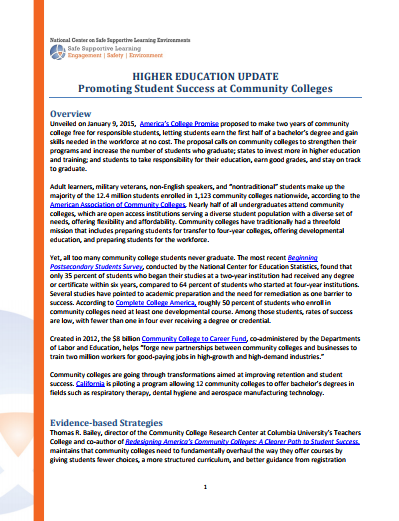 | Promoting Student Success at Community Colleges. Nearly half of all undergraduates attend community colleges, with adult learners, military veterans, non-English speakers, and “nontraditional” students making up the majority. To increase the number of students who graduate, community colleges are implementing evidence-based practices and programs to improve retention and student success. |
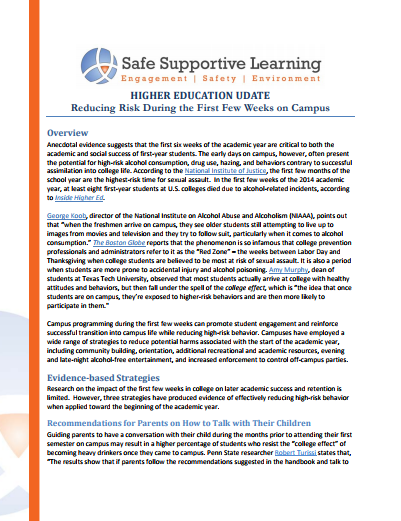 | Reducing Risk During the First Few Weeks on Campus. Colleges and universities can implement evidence-based policies and programs to reduce college students’ drinking and increase retention and graduation. |
NCSSLE podcasts feature insightful conversations with experts and changemakers who are actively working to improve campus climate and conditions for learning. Explore our series to gain valuable insights, strategies, and stories that can inspire and inform your efforts in creating supportive educational environments.
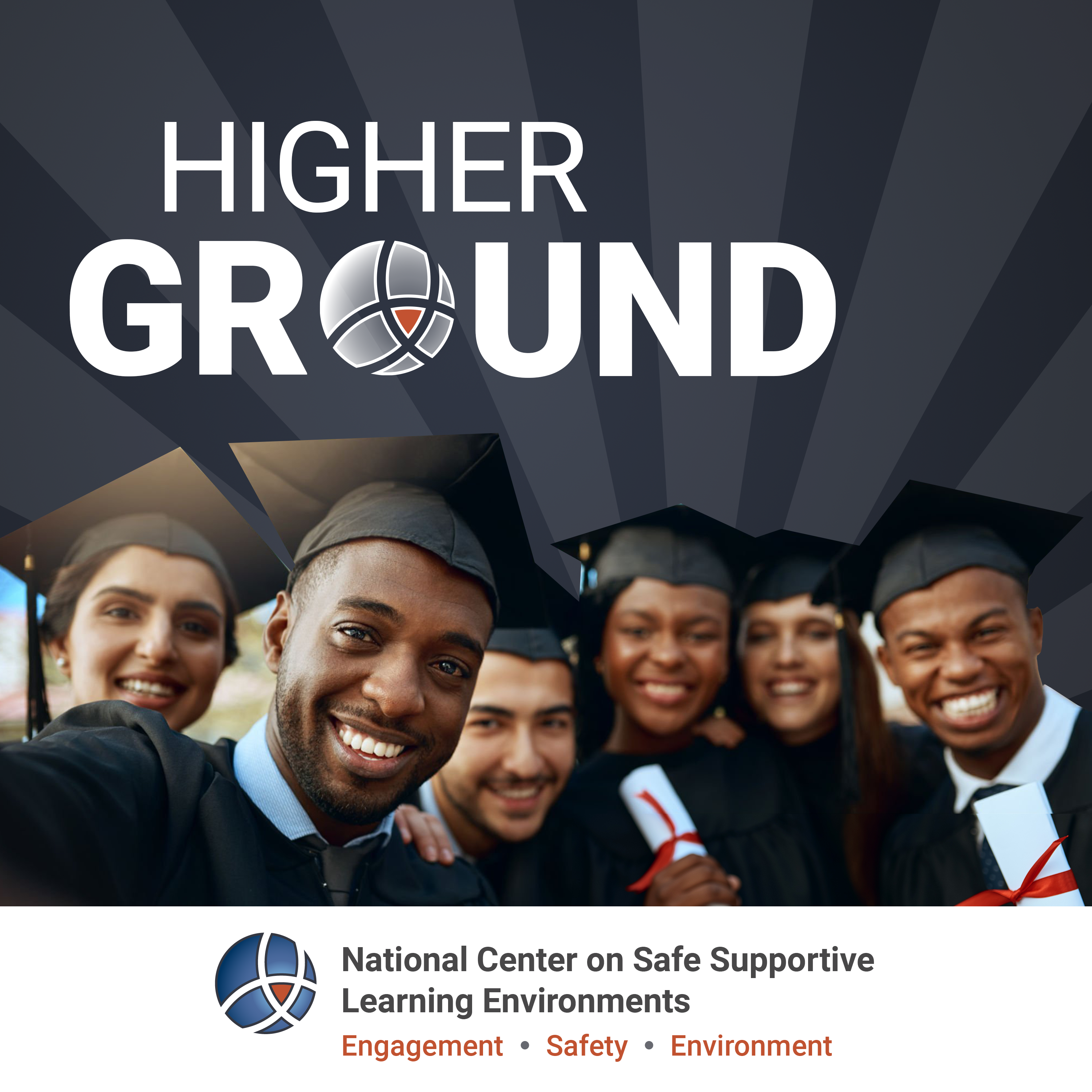 | Higher Ground Podcast Series This series seeks to answer the questions: “What issues related to engagement, safety, and environment are on the minds of the Higher Education community right now?” and “What more can we explore about them?” In this series, our goal is to inspire expanded research on these top-of-mind topics by speaking to experts from the U.S. Department of Education and other Federal agencies. The series also highlights the voices of faculty, administrators, student affairs professionals, and students. Topics explored in the series include digital well-being, mental health, and dual enrollment. |